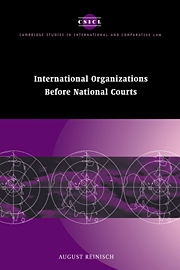Book contents
- Frontmatter
- Contents
- Preface
- Acknowledgements
- Table of cases
- Table of legal instruments
- List of abbreviations
- 1 Purpose, subject and methodology of this study
- PART I DESCRIPTIVE ANALYSIS
- PART II POLICY ISSUES
- 4 Rationales for judicial abstention
- 5 Reasons for asserting jurisdiction
- PART III FUTURE DEVELOPMENTS
- Bibliography
- Index
- Cambridge Studies in International and Comparative Law
5 - Reasons for asserting jurisdiction
Published online by Cambridge University Press: 18 December 2009
- Frontmatter
- Contents
- Preface
- Acknowledgements
- Table of cases
- Table of legal instruments
- List of abbreviations
- 1 Purpose, subject and methodology of this study
- PART I DESCRIPTIVE ANALYSIS
- PART II POLICY ISSUES
- 4 Rationales for judicial abstention
- 5 Reasons for asserting jurisdiction
- PART III FUTURE DEVELOPMENTS
- Bibliography
- Index
- Cambridge Studies in International and Comparative Law
Summary
The following discussion looks at the rationales that are or should be used by courts in asserting jurisdiction over international organizations. It will focus on the reasons for denying or at least restricting the jurisdictional immunity of international organizations as the major abstention rationale.
It starts with a contextual argument, and progresses via systematic reasoning to material policy grounds addressing the interests of international organizations and of third parties potentially affected by an organizations' immunity.
Judicial protection as a public good sought by and against international organizations
The availability of judicial assistance to safeguard one's rights can be viewed as a ‘public good’ sought not only by individuals against international organizations, but also by international organizations in asserting their rights against individuals. Further, the jurisdiction of domestic courts is in the interest not only of an individual or organization seeking their assistance but may also be in the broader interest of the forum state in exercising jurisdiction as a manifestation of public authority.
In Arab Monetary Fund v. Hashim (No. 3), where the judicial protection of an international organization was almost denied on the technical reason of the perceived lack of its domestic legal personality, this interest was clearly spelled out. Closing the door of justice to ‘foreign’ international organizations would not only have caused embarrassment to the foreign ministry of the UK, which had apparently assumed that courts would implicitly recognize the AMF's legal personality, but would also lead to a ‘potential loss of commercial dealings in London’ if international organizations felt that they would be denied judicial protection in England when they sought it.
- Type
- Chapter
- Information
- International Organizations before National Courts , pp. 252 - 314Publisher: Cambridge University PressPrint publication year: 2000



